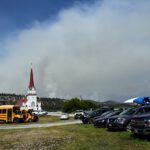Home »

James Lee Burke is a large bore calibre writer
Book Review
By Derryll White
Burke, James Lee (2014). Wayfaring Stranger.
“Burke is a genius, an exemplar of all that is great in American writing.”
– James Connolly
 James Lee Burke has written a consummate love story. Set in America post Second World War, exploring the depths of greed, power and racism inherent in the American South, his two main characters wander through a changing landscape powered only by the love they have for each other.
James Lee Burke has written a consummate love story. Set in America post Second World War, exploring the depths of greed, power and racism inherent in the American South, his two main characters wander through a changing landscape powered only by the love they have for each other.
Burke is so incredibly clear with his language, articulating emotions that most readers cannot even imagine existing. The power of his language diminishes the realities of hate and envy, focusing on the undaunted inner spirit of a man, Weldon Avery Holland, who clearly knows what is holy – his beautiful wife Rosita Lowenstein. Rosita is a survivor of the Nazi death camps, and both she and Weldon are caught in the mad rush for money that was the wildcatting days of the first Texas oil boom.
James Lee Burke pays tribute to his undaunted respect for the history and legends of his country, weaving Bonnie Parker and Clyde Barrow in and out of the developing plot. He puts Bonnie and Clyde in the same legion as Thelma and Louise – American icons of a freedom the country may never know. It is magical.
One of the difficulties of reading Burke, as the excerpts below hint at, is that the pages are full of warm, embracing thoughts and phrases. His novels are extended prose poems and ‘Wayfaring Stranger’ is no exception. Burke honours the roots of his country, the traditions that made it strong, without ignoring the weaknesses of both man and democracy.
Each of James Lee Burke’s novels is a treat, a Christmas experience with unlimited presents to be unwrapped. He is a writer of a large bore calibre – a tank buster who can, at the same time, let the reader relax in the belief that love can overcome.
********
Excerpts from the novel:
A SURVIVOR – The cast in her eyes was unchanged, however. It was different from what survivors of the Great War called the thousand-yard-stare. I had seen that. The eyes were unseeing, as though someone had clicked off a switch inside the person’s head, shutting down his faculties. The expression was glazed, the facial muscles dead. None of these applied to Rosita. The look in her eyes was acceptance; she had seen the evil her fellow humans were capable of, and she did not try to find explanations for it. She also knew that few would want to believe the events she had witnessed, and her attempts to describe them would only make her a pariah. The truth would not make her free; it would become her prison.
 AFTER WW II – It was wonderful to be with Rosita in a country where people cooked fish over open fires at sunrise on the beach. It was time to let the war and the slave camps and the burned cities of Europe slip into memory. We were in the springtime of our lives; the world had survived and was still a place of tropical rain forests and flowers floating on waves along our shores and sunsets that were like a metaphysical representation of the Passions of Christ. America entered a new era; for good or bad, we were the new pilgrims, our gaze fixed on not one but two hemispheres.
AFTER WW II – It was wonderful to be with Rosita in a country where people cooked fish over open fires at sunrise on the beach. It was time to let the war and the slave camps and the burned cities of Europe slip into memory. We were in the springtime of our lives; the world had survived and was still a place of tropical rain forests and flowers floating on waves along our shores and sunsets that were like a metaphysical representation of the Passions of Christ. America entered a new era; for good or bad, we were the new pilgrims, our gaze fixed on not one but two hemispheres.
WEALTH – New Year’s Day of 1947 seemed like the beginning of another celebratory season. Hershel had always said he could not only smell money but he broke into a sweat when he was about to make it. I had come to believe him. Hershel sweated and the money rolled in. One offshore drilling rig after another punched into a pay sand, and the gas flares burning far out on the horizon gave witness to the birth of a new secular religion. We had arrived, and the technological reach of our new nation knew no bounds.
HISTORY – I opened the French doors and stepped out on the balcony. “Jim Bowie died right there,” I said to Rosita, pointing at the chapel. “He was bayoneted to death on his cot. Davy Crockett probably died by the barracks wall.”
Rosita didn’t reply. I stared at the plaza. I had been there many times and had always walked away with the same sensation. I felt that the spirits of the 188 men and boys who died after 13 days of siege were still among us, their ashes under the stones we walked on, their voices whispering to us in the wind, should we ever choose to listen.
MONEY – In the town where I grew up, my grandfather was considered well-to-do. In reality, we barely got by. Once, when I asked him about the importance of money, he replied, “It won’t buy happiness, but it’ll keep a mess of grief off your porch. Rich or poor, everybody gets to the barn. It can be a hard ride, too.”
POWER – When you live in a democracy, there are certain things you believe will never happen to you. Then a day comes when the blindfold is removed and you discover the harsh nature of life at the bottom of the food chain.
ECONOMY – In the years immediately following the war, Hollywood and the drilling industry were probably the only two portals through which a believer in the American dream could wander and suddenly find himself among amounts of wealth and levels of power he never imagined. The prerequisites were few. A teenager who escaped a chain gang in Georgia and climbed off a boxcar in California to pick peaches later became the actor we know as Robert Mitchum.
WAR – At Normandy and at the Ardennes Forest, I had felt empowered, not the other way around. I could kill my enemies at will. If I so chose, I could destroy myself inside a firestorm, perhaps saving the life of another. I lived under the stars and in the snow and in windblown forests like a druid hunting animals with a sharpened stick. I lived one cold, foggy breath away from the edges of eternity; the trappings of civilization meant no more to me than stage props.
 – Derryll White once wrote books but now chooses to read and write about them. When not reading he writes history for the web at www.basininstitute.org.
– Derryll White once wrote books but now chooses to read and write about them. When not reading he writes history for the web at www.basininstitute.org.







